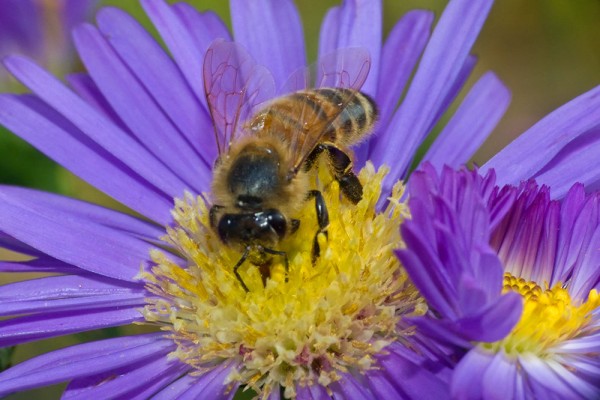蜘蛛毒液成就不伤蜜蜂的杀虫剂
一种新的农药可能会使蜜蜂不受伤害。蜜蜂(Apis melLifera)对美国90%的开花作物进行授粉,但近年来它们的数量已大幅减少。积累的证据表明,一些常用的杀虫剂与蜜蜂死亡有关,这就引发了对不伤害蜜蜂的农药的需求。

在6月3日的《皇家学会学报B》网络版上,一个研究团队报告称他们结合澳大利亚漏斗网蜘蛛(Hadronyche versuta)毒液与雪花莲(Galanthus nivalis)蛋白质,发明了一种对蜜蜂友好的杀虫剂。该团队称,其毒素会选择性攻击常见农业害虫(如甲虫和蚜虫)的中枢神经系统,而不伤害蜜蜂。在让蜜蜂接触新农药7天后,研究人员发现并没有对蜜蜂造成不利影响。即使研究人员将该农药直接注入蜜蜂体内,也只有17%的蜜蜂在48小时内死亡。
该团队接下来计划测试该农药对其他有益的传粉者的影响,如大黄蜂和寄生黄蜂等。
原文摘要:
Novel biopesticide based on a spider venom peptide shows no adverse effects on honeybees
erich Y. T. Nakasu, Sally M. Williamson, Martin G. Edwards,Elaine C. fitches, John A. Gatehouse, Geraldine A. Wright andAngharad M. R. Gatehouse
Evidence is accumulating that commonly used pesticides are linked to decline of pollinator populations; adverse effects of three neonicotinoids on bees have led to bans on their use across the European Union. Developing insecticides that pose negligible risks to beneficial organisms such as honeybees is desirable and timely. One strategy is to use recombinant fusion proteins containing neuroactive peptides/proteins linked to a ‘carrier’ protein that confers oral toxicity. Hv1a/GNA (Galanthus nivalis agglutinin), containing an insect-specific spider venom calcium channel blocker (ω-hexatoxin-Hv1a) linked to snowdrop lectin (GNA) as a ‘carrier’, is an effective oral biopesticide towards various insect pests. Effects of Hv1a/GNA towards a non-target species, Apis mellifera, were assessed through a thorough early-tier risk assessment. Following feeding, honeybees internalized Hv1a/GNA, which reached the brain within 1 h after exposure. However, survival was only slightly affected by ingestion (LD50 > 100 µg bee−1) or injection of fusion protein. Bees fed acute (100 µg bee−1) or chronic (0.35 mg ml−1) doses of Hv1a/GNA and trained in an olfactory learning task had similar rates of learning and memory to no-pesticide controls. Larvae were unaffected, being able to degrade Hv1a/GNA. These tests suggest that Hv1a/GNA is unlikely to cause detrimental effects on honeybees, indicating that atracotoxins targeting calcium channels are potential alternatives to conventional pesticides.
作者:苗妮

